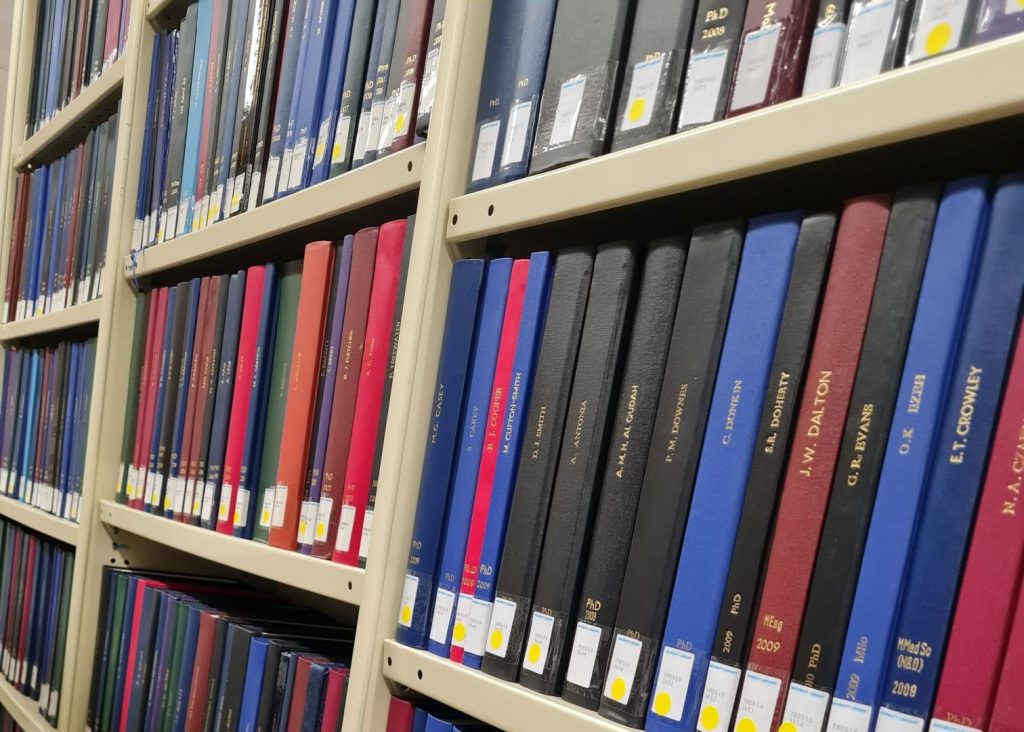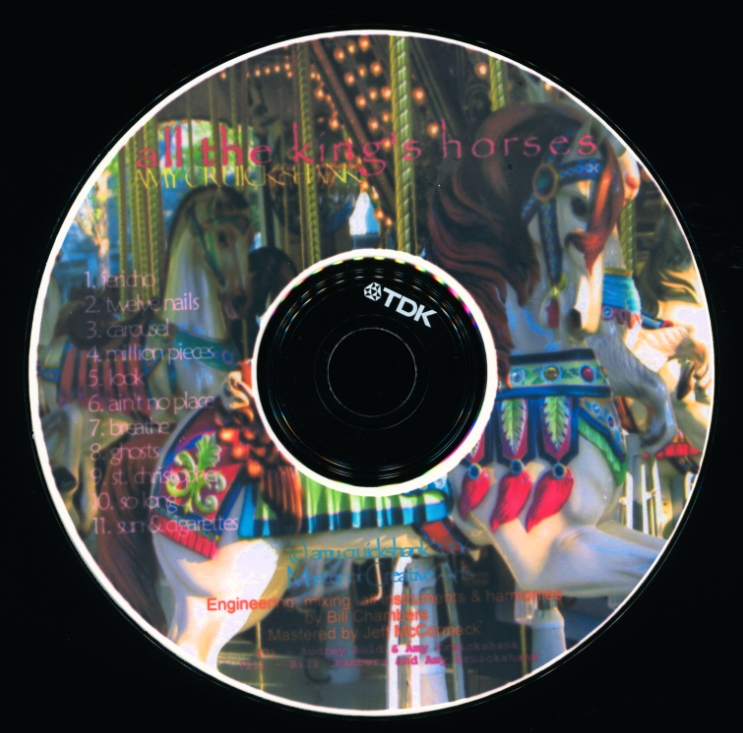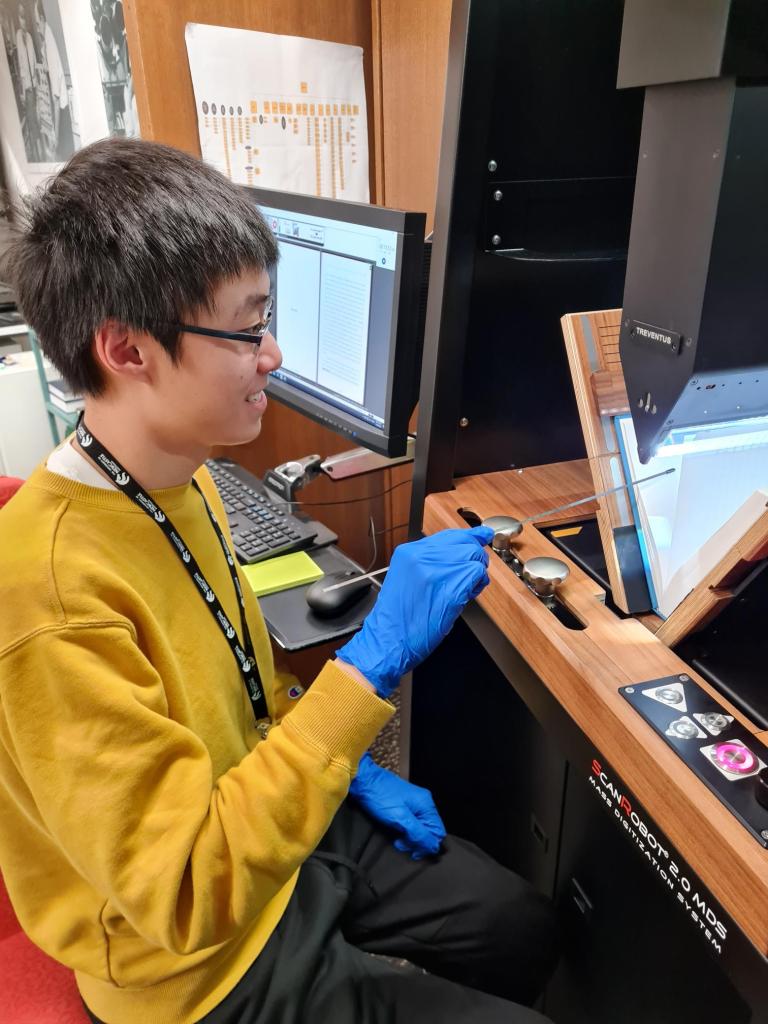THE THESIS DIGITISATION PROJECT
There are approximately 4000 hard copy theses currently archived in the collections of the University Library dating from 1954-2015. Before the start of this project around 500 of these also existed in digital form. Commencing in May 2023, Phase 1 of the ‘Thesis Digitisation Project’ began the mammoth task of digitising hard copy theses dated post-1995, using the Treventus ScanRobot® Book Scanner. In time, these digital copies will be made available on the University of Newcastle’s open access repository NOVA. Permissions are also being sought from individual thesis authors to make the theses open access.
To accomplish the enormous digitisation task at hand, three University of Newcastle students were employed as casual Library Project Assistants. What follows is a reflection of their time on the project while working with Special Collections this year.
THE THESIS DIGITISATION TEAM
Three students were brought on board to form the Thesis Digitisation Team. They include, Hannah Blanch, 1st year Visual Communications student; Giverny Burke, 4th year Creative Industries / Innovation Entrepreneurship student; and Hongdi (Didi) Fang, a 5th year Masters student in Architecture. The team (led by Special Collections Support Librarian, Katy Sentas), worked in the GLAMx lab as a part of the Special Collections team.
In the initial onboarding process, we learnt that some cultural institutions in Australia had given up on using the Treventus and instead opted for digitisation methods that compromised the original texts. Such methods included separating the pages from the book spine and cover – a process the University of Newcastle had trialled prior to the acquisition of the Treventus and our employment. This meeting remains poignant in mind, as we discussed the ethics and juxtaposition of destroying a book to preserve it. This highlighted the significance of our position, and we set forth an eight-month contract for thesis digitisation.
THE PROCESS
In the first month, we became familiar with the library, especially the Treventus book scanner, which we named ‘John Trevolta’. We learnt about the detailed procedures and workflows required to take a book from a stored location on the bookshelf through to digitisation, data entry, and finally, publishing on NOVA.
Initially, two students were rostered each day – with one manning the Treventus and the other looking for contact details of the many thesis authors. Other jobs eventually expanded into the digitisation of supplementary materials (CD’s, VHS etc.); and the post-production of thesis scans, where we created PDF files, suitable for the NOVA open access repository.
The Treventus book scanning machine utilises vacuums to suck pages onto a prism shaped scanner, then automatically turns the pages by blowing a short burst of air. Although the process appears to be ‘hands-off’, the machine requires almost constant observation as the thickness of pages, spine flexibility, and page count all impact the machine’s ability to scan successfully.
STATISTICS
In our Excel sheet, where all digitisation data was entered, Hannah established a data visualisation that was drawn from the information input from each student. After each scan, the number of pages and time taken to scan was documented. This allowed us to better understand how long the process took and other associated statistics. As of the 29th of October 2023, our main statistical findings include:
- There are a total of 1,887 theses published after 1995 to be scanned (with more prior to)
- From May to November 2023, we scanned 695 theses using the Treventus book scanner
- On average, one book scan takes 32 minutes and 30 seconds
- The average thesis has 315 pages
SUPPLEMENTARY MATERIAL
Many of the theses published after 1995 included supplementary material stored on CD-ROMs. Although CDs are relatively new forms of data storage, the quickly progressing and changing nature of technology has rendered some unreadable. For example, some programs are too old to function on modern computers, some CDs had damage or scratches and some could not be read. CD-ROM material varied from operatic recitals to video game soundtracks, with Excel spreadsheets and programs scattered in between.
We quickly learnt to view the CD prior to scanning, as one long thesis had a pdf copy hidden on a CD which we did not open until after scanning the thesis. The inaccessibility of some information brought some answers to the questions that arose in our discussion on ‘why digitize in this way.’ Technological advancements are harder to control than the humidity of a library room – reinforcing the significance of digitising in a non-destructive manner.
OUR FAVOURITE TITLES
The absolute breadth of topics reflects the wider scope of the University and the interests of the local community. As we made our way through the collection of over 2,000 thesis papers, we began to ‘collect’ the titles of those that interested us. These will soon be accessible to read on NOVA! Here are some of our recommendations;
- ‘Away with all of the past, into the fire with all of the archives, libraries and art treasures’ Frederich Nietzsche, Manius Van der Lube and the memoirs of an arsonist (D. R. Morgan)
- The vision and the lure (M. Sala)
- Fantasy in Narrative Painting (A. C. Scott)
- Image databases and the digitization of poster art collections (S. M. O’Brien)
- Feed a cold and starve a demon: The poetics of Madness in Kefalonia (A. Rosso-Buckton)
- Are you Reading me? Character and identity in the First-person voice (R.E. Swinnerton)
STUDENT STAFF EXPERIENCE
Working as student staff member has been a new and meaningful experience for all of us, providing the opportunity to work in a professional environment and contribute to the conservational efforts of the Special Collections team in a meaningful way. Below each of us has listed how working on the thesis digitization project has impacted us, and what we value most about this experience.
Being a part of the thesis digitization team has been one of the highlights of this year for me. Through this position I have been able to develop new skills, learn about archival methods and work with some of the most kind and talented people out there. Everyone in the Special Collections team has been wonderful to interact with and I am extremely grateful for how they all have accepted us student employees and encouraged us to contribute and collaborate in team projects and meetings. While the digitization process is repetitious, I found satisfaction in seeing how over time we were able to scan so many theses and I am proud of my efforts in this position. I have also greatly valued learning about the local culture and history of the Newcastle and Hunter region by discussing current projects with the special collections team and was pleased to see how passionate the team was in sharing their knowledge and expertise. As my time working in the thesis digitization team ends, I look back on this experience with great fondness and appreciation for the work environment the special collections team has fostered, allowing for me to engage with my work in a meaningful way and continually learn about working in a professional environment and the importance of history and conservation.
-Hannah Blanch
This position has not only provided me with an opportunity to learn about innovative technologies – but has introduced me to the wider, incredibly supportive, library team. Although our roles were with the Treventus, I enjoyed the passive learning and small opportunities to work with and learn about the many projects led by the Special Collections team. Most notably I enjoyed assisting with the Hannan project, bringing life and attention to photography slides that could otherwise be lost and forgotten by time. I also thoroughly enjoyed hearing about the many interesting projects going on within the team, everyone was so open to questions and happy to tell us about what they are working on. Each day I am learning something new. Furthermore, the countless opportunities to be introduced to innovative technologies and skill development was beneficial to both my professional development but also brought forth moments of learning and newness is to each week. I have always felt supported by this team, who have facilitated the growth of my skills, and understood the pressures involved in my last semester at university. I hope to reconnect with this department soon in my professional career.
-Giverny Burke
It is truly a wonderful experience working at the GLAMx lab and in the Special Collection team. Nothing is ordinary and everyone is an expert in their field here. Working here feels like being thrown into the center of a tornado of wisdom. I can easily pick up cool facts just from listening to people because interesting topics pop up all the time. It would be very accurate to describe here as the Diagon Alley of digitization. If the GLAMx lab were to adopt a motto, I believe it would be “digitizing any forms of human expression” reflected by the many concurrent digitization projects. Yes, digitising theses is a very tedious process, but just by going through a large amount of what is essentially people’s years of research, it’s hard to not learn anything from them. In fact, my architecture project has been profoundly influenced by some of the theses that I scanned. Other than the main job, the Makerspace workshop, the 3D scan of the Architecture Graduate Exhibition, the Library Staff Conference and so many more meaningful events that I couldn’t count have seriously enriched my life. More importantly, the people in the GLAMx Lab and the rest of the Special Collections team are extremely friendly and supportive. I wouldn’t have imagined a better work environment anywhere else.
– Hongdi Fang
Overall, the time spent with Special Collections and in the GLAMx lab has been incredibly informative for the student team through supporting our learning and professional development. We especially want to thank Katy for teaching and supporting us whilst also successfully completing her PHD – what a feat! These roles have not only facilitated our employment, but also introduced us to the wonderful department that is Special Collections – a group of staff, volunteers, and students alike, who together strive for the preservation and advocacy of local and living histories.
Written by Giverny Burke






One thought on “Three Students Tackle Two Thousand Theses!”